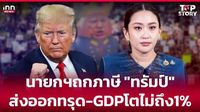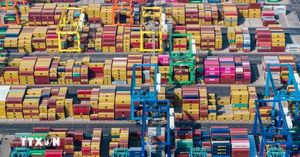In a significant development for Thailand's export sector, Thai Eastern Group Holdings (TEGH) has announced that the United States' upcoming "Reciprocal Tariffs," effective May 9, 2025, will not affect its exports of Technically Specified Natural Rubber (TSNR) to the U.S. market. This assertion comes from Sineenuch Kokanutaporn, the Managing Director of TEGH, who emphasized the company's commitment to expanding its market presence beyond a single region, particularly targeting India and China.
According to a recent statement from TEGH, the company has carefully analyzed the implications of the new tariffs, as outlined in an Executive Order issued by the White House on April 2, 2025. The Executive Order specifies that while certain products, such as automotive tires, will be subject to the new tariffs, TSNR, classified under Harmonized Tariff Schedule of the United States (HTSUS) Codes 40011000 and 40012200, is exempt from additional duties.
"We are confident that our exports of TSNR to the U.S. will not be impacted by the Reciprocal Tariffs, as this product is included in the list of exempt goods," Kokanutaporn stated. She further elaborated that the company has diversified its customer base globally, mitigating risks associated with reliance on a single market.
TEGH, a major player in the natural rubber and palm oil sector in Thailand, has also noted that the rising demand for sustainable products under the European Union Deforestation Regulation (EUDR) will positively influence its sales volume and profit margins this year. Kokanutaporn expressed optimism regarding the company’s growth potential, particularly in light of increased palm oil production expected to rebound from previous years affected by El Niño conditions.
However, the broader implications of Trump's tariff policies have raised concerns among other sectors in Thailand. The former U.S. president's announcement of a staggering 36% tariff on various imports has sent ripples through the Thai economy, which heavily relies on exports to the U.S., accounting for 18.3% of its total export value. The potential for exports to shrink by over 1% looms large, and economists are warning that Thailand's GDP could dip to 1% or lower if these tariffs are imposed.
Aditad Vasinonta, Director-General of the Department of Foreign Trade, highlighted that if exports to the U.S. decline significantly, it could lead to production shifts elsewhere, resulting in job losses and economic instability. Former Finance Minister Thirachai Phuvanatnaranubala echoed these sentiments, stating that a sharp decrease in exports would inevitably impact the Thai labor market.
"If our exports to America drop drastically, factories producing goods for the U.S. market will have to halt production, potentially laying off many workers," Thirachai warned. This concern is compounded by the fact that many of Thailand's top exports are produced by multinational companies that leverage Thailand as a manufacturing base.
In light of these challenges, the Thai government is taking proactive steps to address the situation. Prime Minister Phaethongthan Shinawatra convened a meeting of the Trade Policy Committee on April 8, 2025, to formulate strategies for negotiating with the U.S. and minimizing the adverse effects of the tariffs.
Meanwhile, Apico Hitech, a company with minimal direct exports to the U.S., is also assessing the potential impacts of the tariff changes. Yub Soochon, the CEO of Apico Hitech, noted that the company's direct exports to the U.S. are currently only 0.6% of total revenue, as most of their products cater to different markets. However, the company is closely monitoring the geopolitical and economic landscape to remain adaptable.
Yub stated, "We believe that the current trade policies under the Trump administration will not significantly impact our operations, but we are prepared to respond to any shifts in the market." He emphasized the importance of maintaining a sustainable business model and building long-term value for stakeholders.
The situation remains fluid, with ongoing negotiations and discussions between Thailand and the U.S. likely to shape the future of trade relations. As the country navigates this complex landscape, the resilience and adaptability of Thai businesses will be crucial in mitigating the potential fallout from these tariffs.
In conclusion, while TEGH appears to be insulated from the immediate effects of the Reciprocal Tariffs, the broader implications for Thailand's export economy are profound. The government's proactive stance and the ability of companies to diversify their markets will be key factors in determining the nation's economic stability in the face of these challenges.






